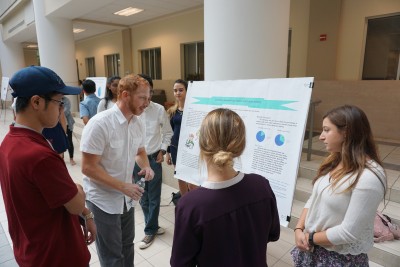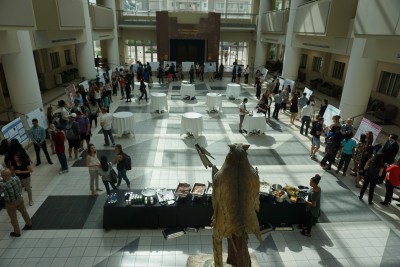NSU Newsroom
SharkBytes
Horizons
This version of NSU News has been archived as of February 28, 2019. To search through archived articles, visit nova.edu/search. To access the new version of NSU News, visit news.nova.edu.
This version of SharkBytes has been archived as of February 28, 2019. To search through archived articles, visit nova.edu/search. To access the new version of SharkBytes, visit sharkbytes.nova.edu.
College of Psychology Hosts Research Poster Conference
Does chewing gum help improve short-term memory? This question, and its answer, were among the many featured in an undergraduate research poster conference, hosted by the College of Psychology.
The research posters were the result of group work conducted by undergraduate students enrolled in PSYC 1020 Introduction to Psychology, during the fall 2017 semester. Associate Professor Matthew Collins, Ph.D., of the Department of Psychology and Neuroscience, designed the poster conference as an expanded version of a project that students worked on in his class the prior year. That first time, students gave research presentations in front of their classmates. This time, Collins expanded the idea to a poster conference in the Carl DeSantis Building’s atrium that includes students in the sections taught by Associate Professors Leanne Boucher, Ph.D. and Tim Razza, Psy.D.
“I wanted to get more faculty involved and make this part of the Intro course,” Collins said.
For this project, students in each class were divided into groups of two to five. The groups submitted their proposals with four questions to study, followed by a literature review of five peer-reviewed articles on their topic. This was followed by a methods proposal, data collection, analysis submission and a poster draft. Between each stage of the process, Collins, Boucher, and Razza provided their students with extensive feedback. The feedback included providing a template for formatting the poster layout, as well as guidelines for how to dress professionally for the conference and how to talk about their research.
“It’s a controlled way to show what research is about, and you get more interaction with the students,” Collins said.
Full story: http://psychology.nova.edu/news-events/ug-poster-conference.html

